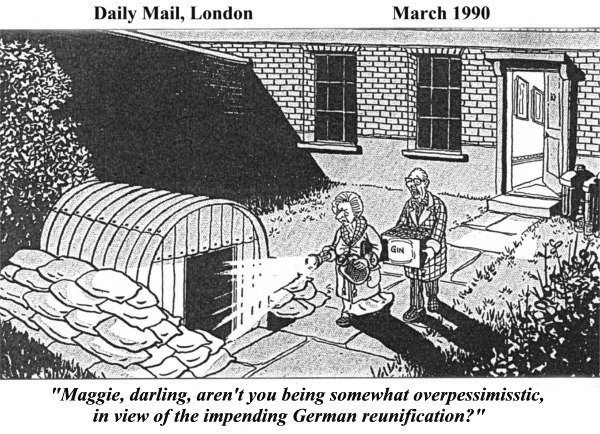
WS 2010/2011 exam translation (advanced) (Staatsexamen Frühjahr 2008) text #11
Alongside unhelpful images and memories, Britain experienced in the 1980s
and 1990s more open anti-German prejudice among her rulers than at any time
since 1945. Within the broader aim of reasserting Britain internationally,
Margaret Thatcher*) and some of her senior
ministers harboured deep personal suspicion of everything German.
Though these were
mainly open secrets to be deduced from their pronouncements, in 1989-92 they
erupted to the surface. Unlike near-contemporaries who themselves had fought
against Germany and come back keen to ensure that no such war should ever happen
again, Thatcher never got over the experience of being a civilian threatened by
the Luftwaffe. As Prime Minister she was constantly amazed that those around her
did not share her views and sought advisers who did, notably her private
secretary Charles Powell. When consulting historians chosen for their expertise
on post-war Germany, she lectured them on what they ought to be advising her to
do, generally what she already intended; [...] Challenged for her views, she
announced that she did not believe in “national guilt”, adding, “but I do
believe in national character”.
Reminded of the size
of Germany’s contribution to the EU budget, she responded, “it’s always
been a misnomer to say that the Germans are the paymasters of Europe. The
Germans have been simply paying reparations for all the things they did during
the war.” Nor was she comforted by West Germany’s economic strength, which
had sustained democracy since 1945, for she “never believed that German
nationalism was dead”; younger Germans were sure to seek reunification and
make their country again the dominant force in Europe. [...] She was unlucky
therefore to be the premier who was forced to carry out the pledge to support
the reunification of Germany given by her post-war predecessors [...].
Struggling to obstruct
the process, she argued like the victors of 1945 that German unity was simply
too big an issue to be decided by Germans for themselves, but received backing
of consequence from nobody who mattered. When Russia, America and France all
accepted German unity, she had little option but to recognize what had happened,
but even then assented only when assured that “sizable” British, French and
American forces would remain on German soil, to contain not a Soviet threat but
a hypothetical German one. This was, as she put it in her memoirs, “one
instance in which a foreign policy I pursued met with unambiguous failure”.
Quelle: John Ramsden, Don 't Mention the War: The
British and the Germans since 1890. London 2007: S. 402-405.
for a longer passage
click
HERE
Don't
Mention the War, SPECIAL (Ramsden)
Fawlty Towers: “The Germans”: a) (excerpt) www.spike.com/video/fawlty-towers-dont/2795405
Noel Coward: text: Don't let's be beastly to the Germans X sound: www.youtube.com/watch?v=wveW9Tw2JKE
Tom Lehrer: text: Tom
Lehrer, Wernher von Braun X
sound: Wernher Von Braun.mp3
A new book (March 2010!) on Germany by a British author:
a) Simon Winder on foreign languages, including
German: languages
b) Simon Winder on German food: German
food
c) Simon Winder visits the Hofbräuhaus: Death
by Oompah
d1) Simon Winder, Germania: Spectator
review, 13/02/2010
d2)
www.spectator.co.uk/books/5765823/an-affable-tour-guide.thtml
e) www.telegraph.co.uk/culture/books/7205965/Germania-by-Simon-Winder-review.html
f1)
www.guardian.co.uk/books/2010/feb/27/germania-personal-history-simon-winder
f2) www.guardian.co.uk/books/2010/feb/27/germania-personal-history-simon-winder/print
g)
http://entertainment.timesonline.co.uk/tol/arts_and_entertainment/books/non-fiction/article7013733.ece
h) www.independent.co.uk/arts-entertainment/books/reviews/germania-by-simon-winder-1903801.html
i) http://news.scotsman.com/entertainment/Book-review-Germania-A-Personal.6069309.jp
plus Patrick Leigh Fermor: Munich, January 1938, Hofbräuhaus
*) CARTOON

more "Un-Kraut" cartoons: www.wepsite.de/cartoons(un-krauts).htm
back to exam translation WS 2010/2011, index back to homepage
THE BOTTOM LINE THE BOTTOM LINE THE BOTTOM LINE THE BOTTOM LINE THE BOTTOM LINE THE BOTTOM LINE THE BOTTOM LINE